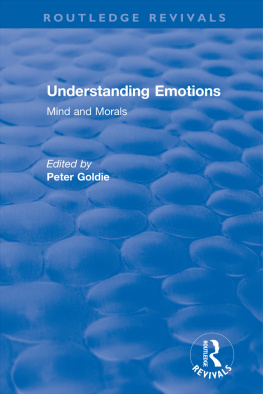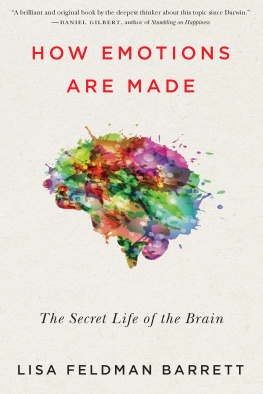Understanding Emotions
Understanding Emotions presents eight original essays on the emotions from leading contemporary philosophers in North America and the U.K.: Simon Blackburn, Bill Brewer, Peter Goldie, Dan Hutto, Adam Morton, Michael Stacker, Barry Smith, and Finn Spicer.
Goldie and Spicer's introductory chapter sets out the key themes of the ensuing chapters: surveying contemporary philosophical thinking about the emotions, and raising challenges to a number of prejudices that are sometimes brought to the topic from elsewhere in the philosophy of mind and moral philosophy. Brewer, Hutto, Goldie and Smith explore the conceptual and epistemological problems of other minds that the emotions raise, and how the emotions can be a source of knowledge of the world around us. The chapters by Stacker, Blackburn and Morton are broadly concerned with issues in morality: Stacker argues for the traditional Aristotelian view that emotions reveal value and are constitutive of value; Blackburn, from a more Augustinian perspective, argues that the virtuous person, like the rest of us, will be emotional but he or she will have the right emotions towards the right objects; Morton cautions against the idea of emotions and narrative as sources of self-understanding. An extensive bibliography completes the book.
Drawing together the arguments of leading contemporary philosophers, focusing on issues in the philosophy of mind, epistemology and moral philosophy, this book offers a wide and deep understanding of the emotions, and will be of interest across the philosophical spectrum to students and researchers of this fascinating and important topic.
Ashgate Epistemology and Mind Series
The Ashgate Epistemology and Mind Series presents contemporary international research at the intersection of metaphysics, epistemology, mind and language. Rooted in an awareness of the great epistemological and metaphysical issues dominating early modern philosophy, but focussed on contemporary, cutting edge research, the series aims to be inclusive and titles cross sub-disciplinary boundaries and integrate philosophy with psychology and other social sciences and the sciences. Offering research-led, yet intellectually accessible, stimulating new contributions to each topic for a wide international breadth of readers, each book breaks new ground in contemporary research to stimulate fresh debate in epistemology and philosophy of mind. This series of individually authored books is framed by a cluster of specially commissioned volumes of essay collections edited by leading scholars in the field. Particular focus areas for the series include: The A Priori; Other Minds; Psychological Explanation; Rationality and Norms of Reason; Empiricism; Contextualism; Direct Perception; Virtue Epistemology; Deductive Argument; Transcendental Arguments; Emotion and Expression; Privileged Access and First Person Authority.
Understanding Emotions
Mind and morals
Edited by
Peter Goldie
King's College London, UK
First published 2002 by Ashgate Publishing
Reissued 2018 by Routledge
2 Park Square, Milton Park, Abingdon, Oxon OX14 4RN
711 Third Avenue, New York, NY 10017, USA
Routledge is an imprint of the Taylor & Francis Group, an informa business
Copyright Peter Goldie 2002
All rights reserved. No part of this book may be reprinted or reproduced or utilised in any form or by any electronic, mechanical, or other means, now known or hereafter invented, including photocopying and recording, or in any information storage or retrieval system, without permission in writting from the publishers.
Notice:
Product or corporate names may be trademarks or registered trademarks, and are used only for identification and explanation without intent to infringe.
Publisher's Note
The publisher has gone to great lengths to ensure the quality of this reprint but points out that some imperfections in the original copies may be apparent.
Disclaimer
The publisher has made every effort to trace copyright holders and welcomes correspondence from those they have been unable to contact.
A Library of Congress record exists under LC control number: 2001040177
ISBN 13: 978-1-138-72460-0 (hbk)
ISBN 13: 978-1-315-19236-9 (ebk)
Simon Blackburn is Professor of Philosophy at the University of Cambridge, and Fellow of Trinity College, Cambridge.
Bill Brewer is Lecturer in Philosophy at the University of Oxford and Tutorial Fellow of St Catherine's College, Oxford.
Peter Goldie is Lecturer in Philosophy at King's College London.
Daniel Hutto is Reader in Philosophy of Psychology and Head of Philosophy at the University of Hertfordshire.
Adam Morton is Professor of Philosophy at Bristol University.
Barry C. Smith is Lecturer in Philosophy at Birkbeck College London.
Finn Spicer is a graduate student in philosophy at King's College London.
Michael Stocker is Guttag Professor of Ethics and Political Philosophy at Syracuse University.
Most of the contributions to this collection were, in earlier forms, presented to a one-day conference, 'Understanding Emotion', in London University's School of Advanced Study Philosophy Programme Conference Series 1999-2000.I am very grateful to the School of Advanced Studies for their support, and to Tim Crane of University College London for suggesting the idea of a conference on the emotions. I am also grateful to those who accepted the invitation to contribute to the conference and to this collection.
Many thanks are also due to Sarah Lloyd and Claire Annals of Ashgate Publishing for their support and help and to Finn Spicer for all his help.
December 2001
Peter Goldie
Chapter 1
Introduction
Peter Goldie and Finn Spicer
It is no longer true, as it used to be until quite recently, that the emotions are a neglected topic for philosophical consideration. This is especially so in the philosophy of mind, where there has been an extraordinary increase in interest. Although it might well be fruitful to consider why this change has taken place, it is not part of the aim of this introduction to do so However, perhaps one thought which lay behind the neglect was connected to something else which is no longer true: the emotions were characteristically thought of by philosophers as states which give rise to perturbation in what might roughly be called right thinking. The idea was, again very roughly, that practical reasoning, like theoretical reasoning, ought to be, and can be, dispassionate: so either the emotions interfere with right reasoning in a way which is a proper object of study for the biological sciences but not for the science of the mind, or, for those more sympathetic to the place of emotion in reasoning, the emotions become reducible to, or analysable as, collections of propositional attitudes which are themselves assessable in terms of right reasoning with any 'residue' again there to be considered by biology. The move away from this idea is surely an improvement in our philosophical approach to the emotions; whatever emotions are, they are surely not a mere adjunct to our lives as so-called rational animals. All of the papers in the volume contribute to this philosophical approach.
But other prejudices and preconceived ideas remain, and the purpose of this introduction, in addition to making a few brief remarks on the individual contributions, is to raise some challenges to these prejudices and ideas, which study of the emotions brings to the fore, as well as making some tentative suggestions of what might be fruitful areas for further research. What follows will be divided into these sections: ontology; biology and the emotions; epistemology; and emotion, action and ethics.













